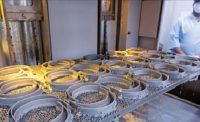AUSTIN, TX—Personal protective equipment manufacturer Armbrust American has announced that its factories are now capable of producing meltblown, the nonwoven fabric material that filters out microscopic particulate matter such as the coronavirus.
In 2019, less than 3 million tons of meltblown material was produced in China, which isn't enough to manufacture a sufficient supply of PPE like surgical and N95 respirator masks. The move to produce its own meltblown allows Armbrust to control costs and better scale its operations so that America's first responders have the protection they need.
"Nine months into this pandemic, a lack of domestic manufacturing is the only explanation for why America still does not have enough PPE," says company founder and CEO Lloyd Armbrust. "Investing to produce our own meltblown means we aren't dependent on other countries, who are more than willing to profit from our lack of preparation."
Meltblown is made from plastic polypropylene pellets that are melted down and "blown" into a nonwoven fabric sheet, which then gets a static charge to improve filter effectiveness. The majority of meltblown material is manufactured in China and sold to U.S. manufacturers at a great cost. This has caused prices for PPE to skyrocket, with some health service providers now passing those exuberant expenses to patients in the form of surcharges, according to recent reports.
"PPE prices skyrocketed globally during this pandemic because China controls the supply, and the situation is scarcely better today. So when demand for PPE rises, America is once again at their mercy, unable to deliver products and held hostage to rampant price gouging," says Armbrust American President Landon Morales. "We can't rely on other countries to supply masks. America needs to take care of itself."
Armbrust is manufacturing a new Electrostatic Armor Meltblown, the company's new proprietary blend of meltblown filtration material that more easily adds a static charge and allows those wearing a mask greater breathability. Despite the premium quality and proprietary process, the company is still able to keep costs lower than what is sold from China.
"The shortage has caused people to rely on reusable cloth masks that offer as little as 10 percent protection against the coronavirus. And now our hospitals are subsidizing Chinese companies to produce something that can be made better and cheaper at home," Armbrust says.



